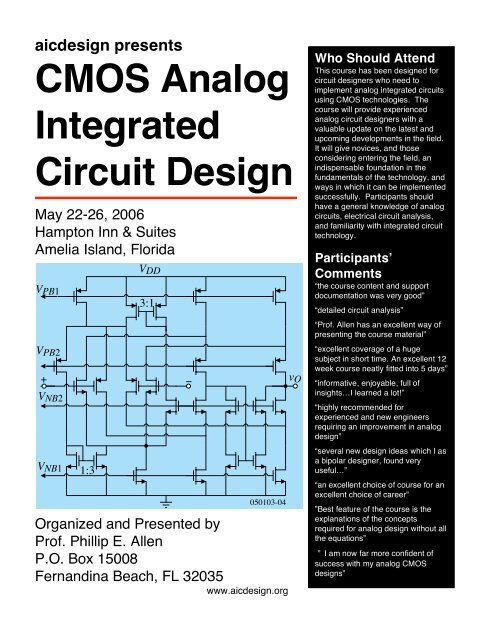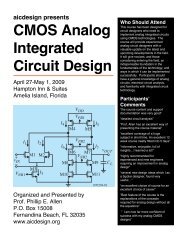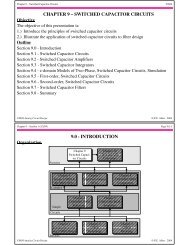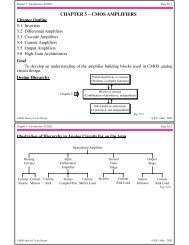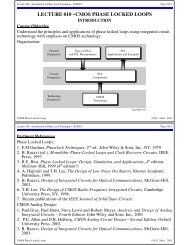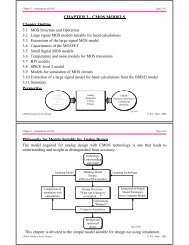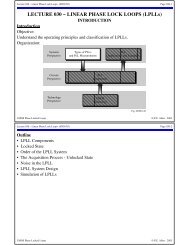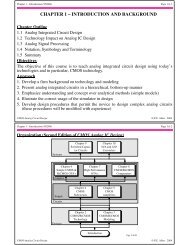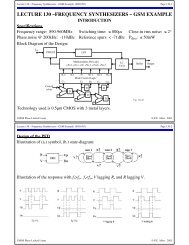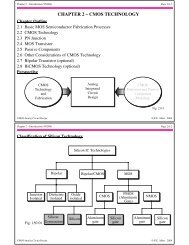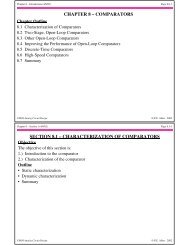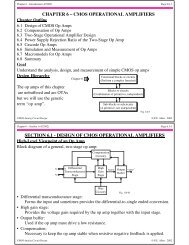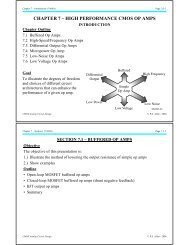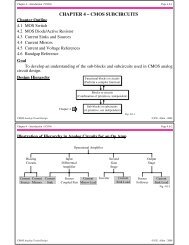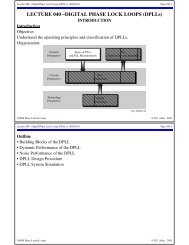CMOS Analog Integrated Circuit Design - Analog IC Design.org
CMOS Analog Integrated Circuit Design - Analog IC Design.org
CMOS Analog Integrated Circuit Design - Analog IC Design.org
You also want an ePaper? Increase the reach of your titles
YUMPU automatically turns print PDFs into web optimized ePapers that Google loves.
aicdesign presents<br />
<strong>CMOS</strong> <strong>Analog</strong><br />
<strong>Integrated</strong><br />
<strong>Circuit</strong> <strong>Design</strong><br />
May 22-26, 2006<br />
Hampton Inn & Suites<br />
Amelia Island, Florida<br />
V PB1<br />
V DD<br />
3:1<br />
Who Should Attend<br />
This course has been designed for<br />
circuit designers who need to<br />
implement analog integrated circuits<br />
using <strong>CMOS</strong> technologies. The<br />
course will provide experienced<br />
analog circuit designers with a<br />
valuable update on the latest and<br />
upcoming developments in the field.<br />
It will give novices, and those<br />
considering entering the field, an<br />
indispensable foundation in the<br />
fundamentals of the technology, and<br />
ways in which it can be implemented<br />
successfully. Participants should<br />
have a general knowledge of analog<br />
circuits, electrical circuit analysis,<br />
and familiarity with integrated circuit<br />
technology.<br />
Participants’<br />
Comments<br />
“the course content and support<br />
documentation was very good”<br />
“detailed circuit analysis”<br />
“Prof. Allen has an excellent way of<br />
presenting the course material”<br />
V PB2<br />
+ − v O<br />
V NB2<br />
V NB1<br />
1:3<br />
050103-04<br />
Organized and Presented by<br />
Prof. Phillip E. Allen<br />
P.O. Box 15008<br />
Fernandina Beach, FL 32035<br />
www.aicdesign.<strong>org</strong><br />
“excellent coverage of a huge<br />
subject in short time. An excellent 12<br />
week course neatly fitted into 5 days”<br />
“informative, enjoyable, full of<br />
insights…I learned a lot!”<br />
“highly recommended for<br />
experienced and new engineers<br />
requiring an improvement in analog<br />
design”<br />
“several new design ideas which I as<br />
a bipolar designer, found very<br />
useful…”<br />
“an excellent choice of course for an<br />
excellent choice of career”<br />
”Best feature of the course is the<br />
explanations of the concepts<br />
required for analog design without all<br />
the equations”<br />
“”“I am now far more confident of<br />
success with my analog <strong>CMOS</strong><br />
designs” design...detailed circuit<br />
analysis”
Course Description<br />
This course has been designed:<br />
• To provide a state-of-the-art review of the principles,<br />
concepts, and techniques needed to carry out the<br />
successful design of <strong>CMOS</strong> analog integrated circuits.<br />
• To expose the participants to the methods used in the<br />
processing and design of such circuits, including electrica<br />
modeling, characterization of the process parameters,<br />
SP<strong>IC</strong>E simulation techniques, testability considerations,<br />
and methods of experimental verification.<br />
• To combine an academic viewpoint with practical<br />
examples and industry experience.<br />
What is the Course About?<br />
The course provides a bottom-up, hierarchical approach<br />
to the subject of analog circuit and systems design using<br />
standard <strong>CMOS</strong> technologies. Simple modeling<br />
techniques are used to gain an understanding of and<br />
insight into the function of circuits. Computer simulation<br />
is used to predict circuit performance. Techniques<br />
suitable to enhanced performance using integrated<br />
circuit technology are used. In addition, the implications<br />
of <strong>IC</strong> fabrication are used whenever possible to<br />
associate the electrical performance with the physical<br />
attributes of the circuit.<br />
Course Description<br />
Introduction to Technology<br />
• Basic MOS Semiconductor Fabrication Processes<br />
• PN Junction<br />
• MOS Transistor<br />
• <strong>CMOS</strong> Transistors<br />
• BJT Transistors<br />
• Passive Components<br />
• Other Technology Considerations<br />
<strong>Analog</strong> <strong>Circuit</strong> Modeling<br />
• Simple MOS Large Signal Model<br />
• Modifications for Submicron Technology<br />
• Small-signal MOS Model<br />
• BJT Large-signal Model<br />
• BJT Small-signal Model<br />
• Computer Models<br />
• Extraction of Simple Model using the Computer<br />
<strong>Analog</strong> Subcircuits<br />
• The MOS Switch<br />
• MOS Diode<br />
• MOS and Bipolar Current Source/Sinks<br />
• Current Mirrors<br />
• Current and Voltage References<br />
• Bandgap Voltage References<br />
Amplifiers<br />
• Simple Inverters<br />
• Differential Amplifiers<br />
• Cascode Amplifiers<br />
• Current Amplifiers<br />
• Output Amplifiers<br />
• High Gain Architectures<br />
Operational Transconductance Amplifiers<br />
• General <strong>Design</strong> Principles of Op Amps<br />
• Compensation of OTA's<br />
• Two-stage <strong>CMOS</strong> OTA <strong>Design</strong><br />
• Power Supply Rejection Ratio of the Two-Stage Op Amp<br />
• Cascode Op Amps<br />
• Simulation and Measurement Techniques<br />
• Macromodels for Op Amps<br />
High Performance Op Amps<br />
• Buffered Amplifiers<br />
• High-Speed/Frequency Op Amps<br />
• Differential Output Op Amps<br />
• Micropower Op Amps<br />
• Low Noise Op Amps<br />
• Low Power Supply Op Amps<br />
Comparators<br />
• Characterization of Comparators<br />
• Two-stage Open-loop Comparator<br />
• Other Open-loop Comparators<br />
• Improving the Performance of Open-loop Comparators<br />
• Discrete-time comparators<br />
• High-speed comparators<br />
Digital-<strong>Analog</strong> & <strong>Analog</strong>-Digital Converters<br />
• Characterization and Definition of D/A and A/D<br />
Converters<br />
• Current Scaling D/A Converters<br />
• Voltage Scaling D/A Converters<br />
• Charge Scaling D/A Converters<br />
• Voltage and Charge Scaling D/A Converters<br />
• Other Types of D/A Converters<br />
• Characterization and Definition of A/D Converters<br />
• Serial A/D Converters<br />
• Medium-Speed A/D Converters<br />
• High-Speed A/D Converters<br />
• Oversampled A/D Converters<br />
• State of the Art A/D Converters, Limits of A/D •<br />
Converters<br />
For questions regarding course content,<br />
contact Dr. Phillip Allen via e-mail at<br />
pallen@ece.gatech.edu or by phone at 9004-491-1093
Course Instructor<br />
The course will be presented by Dr. Phillip Allen, who is<br />
Professor Emeritus at Ge<strong>org</strong>ia Instittute of Technology in<br />
Atlanta, GA, USA. Dr. Allen has over 40 years of<br />
experience in teaching and research of analog integrated<br />
circuits. He is a registered electrical engineer in the state<br />
of California and is a Life Fellow of the IEEE. He is widely<br />
regarded as one of the foremost international authorities<br />
on analog <strong>CMOS</strong> circuit design. He has worked and<br />
consulted with many companies, including Lawrence<br />
Livermore Laboratory, General Motors (Delco), Pacific<br />
Missile Range, Texas Instruments, Lockheed Research<br />
Laboratory, and National Semiconductor. Dr. Allen has<br />
taught at the University of California (Santa Barbara),<br />
Texas A&M University, and Ge<strong>org</strong>ia Tech. He is the coauthor<br />
of “Introduction to Theory and <strong>Design</strong> of Active<br />
Filters” (1980), “Switched Capacitor <strong>Circuit</strong>s” (1984),<br />
“<strong>CMOS</strong> <strong>Analog</strong> <strong>Circuit</strong> <strong>Design</strong>” (1987), and “VLSI<br />
Techniques for <strong>Analog</strong> and Digital <strong>Circuit</strong>s” (1990). He<br />
teaches short courses on <strong>CMOS</strong> analog circuit design in<br />
Europe, Asia and the USA on a regular basis.<br />
Registration<br />
Register by:<br />
Mail:<br />
Web:<br />
<strong>CMOS</strong> <strong>Analog</strong> <strong>Circuit</strong> <strong>Design</strong><br />
P.O. Box 15008<br />
Fernandina Beach, FL 32035<br />
www.aicdesign.<strong>org</strong><br />
After you register, you will receive your confirmation letter<br />
with detailed instructions.<br />
A<strong>IC</strong><strong>Design</strong> reserves the right to cancel a course for any<br />
reason, including insufficient enrollment. If a course is<br />
cancelled, all registration fees will be refunded.<br />
Course Fee<br />
The course fee of $1,695 includes all necessary<br />
classroom materials (lecture notes and copy of “<strong>CMOS</strong><br />
<strong>Analog</strong> <strong>Circuit</strong> <strong>Design</strong>” , second edition). Checks can be<br />
made payable to <strong>CMOS</strong> <strong>Analog</strong> <strong>Circuit</strong> <strong>Design</strong>, or<br />
charges to VISA, MasterCard, American Express or<br />
Discover cards can be made through registration at<br />
www.aicdesign.<strong>org</strong>.<br />
You are encouraged to register early to ensure your place<br />
in the course. Please remit payment no later than 10<br />
days prior to the course start date. Advance payment<br />
arrangements are required to guarantee your place in the<br />
class.<br />
Course Location and Accomodations<br />
The May 2006 offering will be held at the Hampton Inn &<br />
Suites, located at 19 South Second Street, Fernandina<br />
Beach, Florida 32034, USA. This hotel is located in the<br />
historic downtown district on Amelia Island. A block of<br />
rooms has been reserved for program registrants, but will<br />
be released two weeks prior to the program at Hampton<br />
Inn & Suites. Mention that you are attending the <strong>CMOS</strong><br />
<strong>Analog</strong> <strong>Integrated</strong> <strong>Circuit</strong> <strong>Design</strong> short course for a<br />
special room rate (the group code is EEC). For hotel<br />
reservations, call 1-800-HAMPTON or go to<br />
www.hamptoninnandsuites.net.<br />
Amelia Island is a 38 minute drive northeast of<br />
Jacksonville International Airport. Transportation between<br />
Jacksonville International Airport and Amelia Island is<br />
available at the airport. By automobile leave the airport<br />
on Dixie Clipper Rd. which becomes FL-102E. After 1.6<br />
miles, merge north onto I-95N. After 9 miles on I-95N<br />
take the SR-A1A exit (Exit 373) and proceed east toward<br />
Yulee/Amelia Island. After 14.2 miles on SR-A1A/ SR-<br />
200, turn left onto Ash Street. Go 0.3 miles and turn right<br />
onto South Second St. The Hampton Inn and Suites is<br />
located at 19 South Second Street.<br />
Course Times and Schedule<br />
The daily schedule for the course is:<br />
08:30 Session I<br />
10:00 Morning Break<br />
10:15 Session II<br />
11:45 Lunch (not provided but there are many<br />
restaurants nearby)<br />
01:15 Session III<br />
02:45 Afternoon Break<br />
03:00 Session IV<br />
04:30 Day ends (Friday the day ends at 03:00)<br />
Cancellations and Refunds<br />
To cancel your registration and receive a full refund, you<br />
must call (404) 603-9374 at least 10 business days prior<br />
to the course start date or send an e-mail to<br />
pallen@ece.gatech.edu. A cancellation received fewer<br />
than 10 days prior to the start date will be refunded the<br />
registration amount, less $100 to cover the costs of the<br />
materials and facilities. If you do not call or send an e-<br />
mail to cancel your registration and do not attend the<br />
course you are still responsible for the full fee.<br />
Other Courses<br />
Other courses in analog design are available from<br />
aicdesign. These courses include Phase-Lock Loops,<br />
Switched Capacitor <strong>Circuit</strong>s, and the Practice of <strong>Analog</strong> <strong>IC</strong><br />
<strong>Design</strong> (in 2006).
A<strong>IC</strong><strong>Design</strong> Short Courses<br />
P.O. Box 15008<br />
Fernandina Beach, FL 32035<br />
<strong>CMOS</strong> <strong>Analog</strong> <strong>Integrated</strong> <strong>Circuit</strong> <strong>Design</strong><br />
May 22-26, 2006, Amelia Island, Florida<br />
REGISTRATION FORM<br />
<strong>CMOS</strong> <strong>Analog</strong> Intergrated <strong>Circuit</strong> <strong>Design</strong> May 22-26, 2006 Course Fee $1695<br />
Please remit payment no later than 10 days prior to the course start date. Send to:<br />
A<strong>IC</strong><strong>Design</strong>, P.O. Box 15008, Fernandina Beach, FL 32035<br />
I cannot attend this program, but add me to your mailing list.<br />
PLEASE PRINT CLEARLY<br />
Name:________________________________________________________________________________________<br />
Position:_________________________________Organization:___________________________________________<br />
Address:_______________________________________________________________________________________<br />
City:___________________________________________State:________________ZIP:_______________________<br />
Daytime Phone Number:_______________________________FAX Number:________________________________<br />
E-mail:________________________________________________________________________________________<br />
PAYMENT OPTIONS<br />
Check in the amount of $1695 per attendee, made payable to <strong>CMOS</strong> <strong>Analog</strong> <strong>Integrated</strong> <strong>Circuit</strong>s Course<br />
(Please include attendee’s name and course date on all checks.)<br />
Credit card payments can only be made through web registration (www.aicdesign.<strong>org</strong>)<br />
I heard about this course by: brochure web e-mail fax co-worker regular mail other


